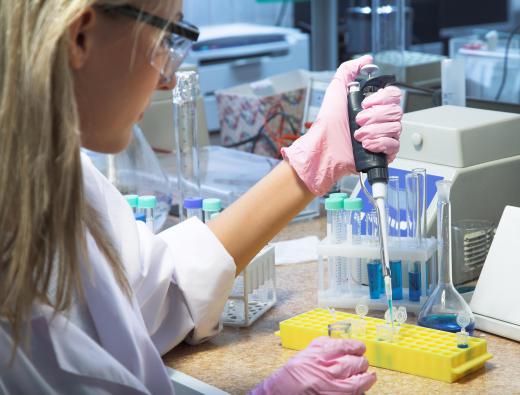At AllTheScience, we're committed to delivering accurate, trustworthy information. Our expert-authored content is rigorously fact-checked and sourced from credible authorities. Discover how we uphold the highest standards in providing you with reliable knowledge.
What are the Different Methods of Antibody Storage?
The study of antibodies can be an important area of biomedical research and development. In general, this is due to the valuable role antibodies might play in helping the immune system function properly. Antibody storage in laboratories can be a significant part of the research and development process, as proper storage methods can help ensure that antibodies remain undamaged.
Antibodies are types of proteins commonly found in the blood. They generally are considered to be a crucial part of the immune system, which uses them to both identify and fight off bacteria and viruses. All antibodies normally have the same basic structure, but an area at the tip of the protein can vary widely. The differences in antibodies allow them to perform different functions for the immune system, such as assisting in the disabling of any number of different types of bacteria and viruses.

There is no standard method for antibody storage. This generally is due to the wide variety of antibodies that exist, combined with a lack of consensus in the scientific community regarding the best methods for storage. However, since antibodies are proteins, most methods of storage emphasize that antibodies should be kept cold. This usually means that antibodies should be refrigerated, kept on ice, or frozen.

Many experts recommend that antibodies be kept at a temperature of 39 degrees Fahrenheit (4 degrees Celsius) at the outset of the storage process. Approaches can differ on how long this temperature should be maintained. Some scientists believe that this temperature should only be maintained for a maximum of two weeks, after which the antibody is to be properly frozen. Afterward, a temperature of -2 degrees Fahrenheit (–20 degrees Celsius) usually is recommended, although some scientists will store antibodies at a temperature as low as -112 degrees Fahrenheit (–80 degrees Celsius).
The location of the antibody within the freezer also is an important difference in antibody storage methods. To avoid any drastic changes in temperature, some methods emphasize placing the antibody at the back of the freezer as opposed to the front. This generally is intended to reduce the susceptibility of the antibody to the temperature fluctuations that can occur when the freezer door is continually opened and closed.
Aliquoting also is a possible antibody storage method. The size for an aliquot can vary, however quantities generally are between 0.507 ounces to 0.675 ounces (15 to 20 milliliters). Aliquots may help minimize any damage to the antibody that is the result of freezing or thawing. It also could reduce the chances of any contamination that may occur in the process.
Avoiding freezing and thawing cycles usually is emphasized in many antibody storage methods. This is because the change in temperatures may damage the antibody. Freezing and thawing usually can occur one time in the storage process, but any more might denature the antibody which, for example, could prevent the antibody from binding. Accordingly, frost-free freezers usually are not recommended for antibody storage, as these refrigerating devices may automatically cycle between freezing and thawing.
AS FEATURED ON:
AS FEATURED ON:












Discuss this Article
Post your comments